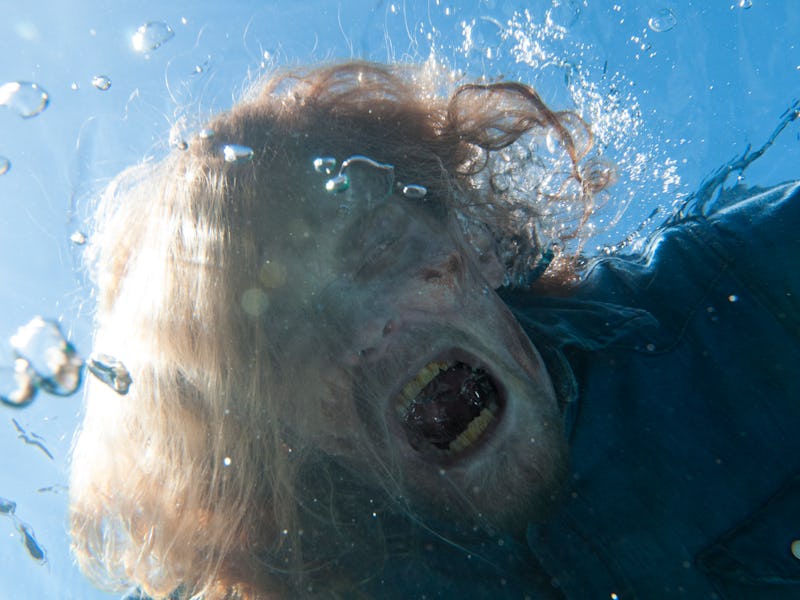Are Zombies More Dangerous in the Ocean?
Zombies have made it to sea. Does it make any sense?

As it turns out, hiding out at sea isn’t much safer than being on land during a zombie apocalypse. Food and fresh water are limited, the weather is unforgiving, and disease spreads really quickly. And the one advantage you’d think you’d have — distance from zombies — is fleeting.
In Season 2 of Fear the Walking Dead, the spin-off to hit AMC series The Walking Dead, a family climbs aboard a stranger’s yacht to escape zombie-ridden Los Angeles only to find an ocean teeming with the dead.
As they discover, while zombies can’t swim, their porous corpses make them more actice. In the interest of future survival and holding a fictional zombie show accountable to biology, Inverse consulted with Eric Schulze, a PhD-holding molecular and cellular biologist who hosts a weekly Smithsonian series called Ask Smithsonian. As he told us, while zombies can survive on the ocean, it’s not a great long-term prospect for them.
“I had to make some approximations from bacteria. I don’t know too many people that study zombies floating in the ocean,” Schulze joked with Inverse over the phone. “The ocean is a harsh place for any biological tissue that lives on land. Especially tissue that’s no longer regulating its normal function. With zombies those rules go out the window.”
Put more plainly, something dead or dying in the ocean isn’t going to last. By Dr. Schulze’s calculations — factoring in weather, temperature, and even ocean currents — an active zombie corpse will last just two weeks. But how?
The first threat to the zombie? The little creatures that live in the ocean.
“The ocean is exploding with bacteria and viruses,” Dr. Schulze said. “Bacteria is really good at decomposing stuff. As soon as they find that zombie body, it would take probably less than two weeks for that zombie body to be completely gone.”
The second threat is physics. Osmotic pressure, Dr. Schulze explained, will make bloated zombies pop like balloons under the sea.
“If [a zombie] happens to survive the bacteria and all of the things floating around that want to munch on flesh, the physics of the ocean will guarantee their body will swell and pop.”
Now that you have that visual in your head, here’s how it happens:
“If you’ve ever tried to remove saltwater to make ocean water drinkable, it’s expensive and hard,” Schulze added. “If we think of this as sort of desalination in reverse, what the ocean is going to do is desalinate that zombie. It’s going to suck all the stuff out of its tissue quickly, then bloat. Once all that stuff has been sucked out, the ocean water will get inside and it will fall apart… which will further entice all these creepy crawlies in the ocean to eat and digest the rest. Within a matter of days, potentially.”
Nick (Frank Dillane) swims with the dead in the Season 2 premiere of 'Fear the Walking Dead.' He really shouldn't have.
So, are the oceans safe after all? According to Schulze, it depends where you’re cruising. Currently on Fear the Walking Dead, the passengers aboard the Abigail are sailing down the Pacific from Los Angeles to San Diego (and after this week, Baja, against everyone’s wishes). But what if it were somewhere colder, like the Arctic? The zombie will still decompose, just differently.
“A backyard pond in Louisiana in August is going to be bacterial soup of living things that will eat anything that comes in. A Russian Arctic lake, that has low oxygen [and] not a lot of life in it, would be like the deep ocean where it would take years [to decompose]. In a tropical zone that body is not going to last long at all. There’s open wounds. The zombie itself is carrying tons of bacteria in its digestive tract and skin, living in a watery environment is paradise for the bacteria in and around them.”
In fact, Schulze warns this is where zombies get really dangerous at sea. While in Walking Dead lore, all living beings are capable of turning, in any other scenario (like say, 12 Monkeys or iZombie), swimming with zombies is just as fatal as getting bit. “If we assume [the virus is] carried by blood or a protein in the blood or their saliva, if you’re in a moderately strong current with high amounts of water [the pathogen is] going to be dissolved to a point where it would be undetectable. It would be like a Where’s Waldo of the zombie protein, floating in the ocean.”
But Schulze says that the ocean is still a better place to hang out during a zombie apocalypse.
“I would definitely rather be at sea,” he answers. “Give me a mai tai and the bow of a ship.”